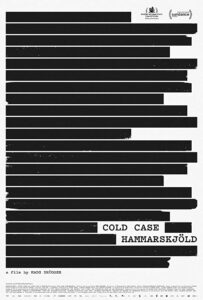Experimental investigative documentary becomes a filmmaker journey.


When Danish filmmaker Mads Brügger (see 2011’s “The Ambassador”) checks out a famous cold case with Swedish private investigator Göran Björkdahl, he naturally brings to the matter his acerbic wit and penchant for off-kilter tone. In assisting in the investigation into the 1961 mysterious death of UN Secretary General Dag Hammerskjöld, Brügger becomes obsessed. It’s a tunnel vision that the two men share, possibly, to their detriment. And because so much of what they find only leads them down dark rabbit holes, their years long expedition proves more frustrating that revealing. It’s frustrating for them, because the answers are ever-elusive, but for the viewer, it’s fascinating and bloody good fun.
The story starts back in 1961, long before Brügger was born. Dag Hammerkjöld was serving as the UN Secretary General. His chief goal, according to this documentary, was to assist African nations. This caused Hammerkjöld to run afoul of some dangerous people, and it may have also resulted in his assassination. Of course, the official story is that he died in a plane crash due to either a mechanical failure or pilot error. Brügger and his partner in the investigation, Björkdahl, think that there was a cover up, and they set out to prove it.

What the two men discover may shine some light on a possible alternate theory about the cause of the plane crash, but finding answers really aren’t important. The questions raised are the most intriguing thing. This leads them to Africa, and the revelation of a shadowy mercenary organization that had its fingers in some very dirty business.
Documentary filmmakers will be keenly interested in Brügger’s technique in which he inserts himself into the narrative. By peeling back the curtain on his process, we see his investigation and how he “finds” his story. Starting out thinking he’d focus on the mysterious death, possibly murder, of Hammerskjöld, Brügger is disappointed to learn that he’s not going to find anything more than a conspiracy theory with little hard evidence. However, his efforts are not all for nothing, and as he and Björkdahl dig, sometimes literally, they discover a possibly wider and more disturbing past in Africa.

Along the way, Brügger never loses his dry sense of humor, and anyone who saw his last film, “The Saint Bernard Syndicate,” will pick up on some of his go-to notes. It’s hard to separate Brügger the serious documentarian from Brügger the comedian. While it’s possible that he can be both simultaneously, the quirky manner in which this documentary is constructed (using animation and theatrical elements) might frustrate some viewers.
For example, while investigating one scary organization, Brügger dresses as its frightening leader and even stays in the same African hotel that the feared man was alleged to have occupied. Brügger employs the services of not one, but two local secretaries to which he separately dictates the film’s narration. The secretaries become characters in the film (a kind of Greek chorus) and often ask him questions about what they are typing (on an old typewriter). The small notes they type become title cards in the film, providing visual cues to push the story along, revealing the investigative process in action. It’s tedious, but really clever.

It’s this level of invention that I found infectious, Brügger’s experimentation is almost entirely successful. However, I believe it may take another go with another story before he’s transcended the form. And that film may give viewers answers instead of just more questions.
It’s important to point out that some viewers will question whether this is a documentary at all. My answer is that it is an essay not about a cold case, but about the two men following up on that case. To that extent, “Cold Case Hammerskjöld” is one of the oddest and most unique documentaries I’ve seen this year.
NOTE: The documentary form is being manipulated producing some very entertaining, if also, not entirely successful films. One example is Hulu’s “The Amazing Johnathan Documentary.” That messy experiment documents filmmaker Benjamin Berman’s efforts to make a movie about the comic magician The Amazing Johnathan. It’s a real train-wreck of a picture and, of course, that’s the point.
When a documentary eats itself, as it did with that one, all the director can do is turn the camera inward. The trick is to have someone on the other side of the lens worth watching.
